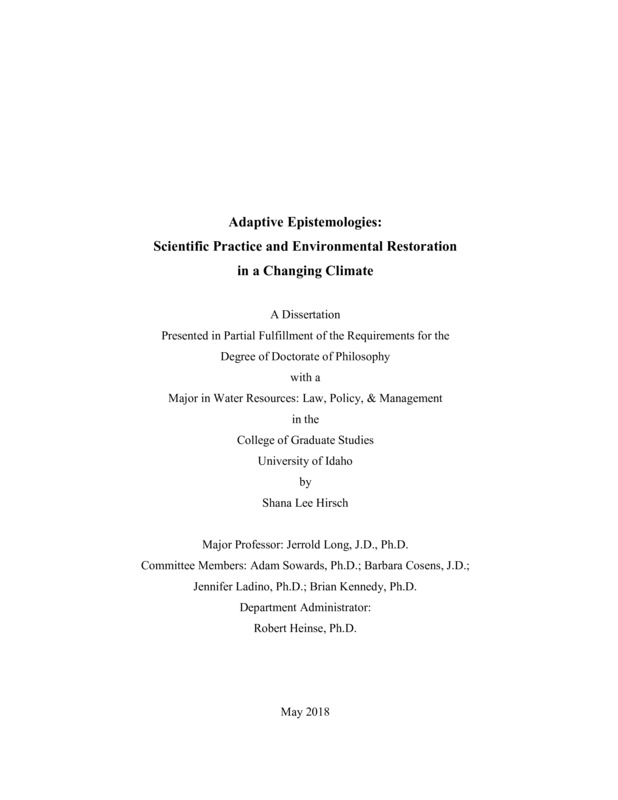Adaptive Epistemologies: Scientific Practice and Environmental Restoration in a Changing Climate
Hirsch, Shana Lee. (2018-05). Adaptive Epistemologies: Scientific Practice and Environmental Restoration in a Changing Climate. Theses and Dissertations Collection, University of Idaho Library Digital Collections. https://www.lib.uidaho.edu/digital/etd/items/hirsch_idaho_0089e_11351.html
- Title:
- Adaptive Epistemologies: Scientific Practice and Environmental Restoration in a Changing Climate
- Author:
- Hirsch, Shana Lee
- ORCID:
- 0000-0003-3131-1701
- Date:
- 2018-05
- Embargo Remove Date:
- 2020-09-05
- Keywords:
- Adaptation Columbia River Basin Ecological Restoration Endangered Species Natural Resources Management Science Studies
- Program:
- Water Resources
- Subject Category:
- Environmental management; Climate change; Environmental studies
- Abstract:
-
The role of science in adaptation and change in socio-ecological systems has been under-conceptualized. While gathering data and increasing knowledge will undoubtedly help facilitate decision-making, adaptation within epistemic communities themselves also requires attention. This research explores how scientific practices and the knowledge infrastructures, institutions and organizations that support them are adapting to meet emerging societal goals and shifting environmental conditions. In this ethnographic study, I examine how salmon habitat restorationists in the Columbia River Basin, USA, are dealing with the uncertainty and complexity that climate change is introducing to their epistemic work. I historically situate the development of the field of ecological restoration, analyze how science relates to legal and political goals for salmon habitat restoration, and conceptualize how scientific practice adapts to the uncertainty and indeterminacy that results from climate change. To do this, I engage theoretical concepts from the field of science, technology, and society (STS) with environmental governance and management theory. By examining scientific practice, knowledge infrastructures, and institutions and organizations, I develop a conceptual framework for “adaptive epistemologies,” in which scientists alter the way they produce knowledge using the strategies of emergence, acclimation, and anticipation. I argue that we need to consider adaptation to environmental change more closely in scientific work itself, including considering how collective goals relate to knowledge production, thereby facilitating or hindering adaptation. This can be developed by extending the notion of collective empiricism to call for transdisciplinary engagements between disparate disciplines and fields.
- Description:
- doctoral, Ph.D., Water Resources -- University of Idaho - College of Graduate Studies, 2018-05
- Major Professor:
- Long, Jerrold A
- Committee:
- Sowards, Adam M; Cosens, Barbara A; Ladino, Jennifer K; Kennedy, Brian P
- Defense Date:
- 2018-05
- Identifier:
- Hirsch_idaho_0089E_11351
- Type:
- Text
- Format Original:
- Format:
- application/pdf
- Rights:
- In Copyright - Educational Use Permitted. For more information, please contact University of Idaho Library Special Collections and Archives Department at libspec@uidaho.edu.
- Standardized Rights:
- http://rightsstatements.org/vocab/InC-EDU/1.0/

